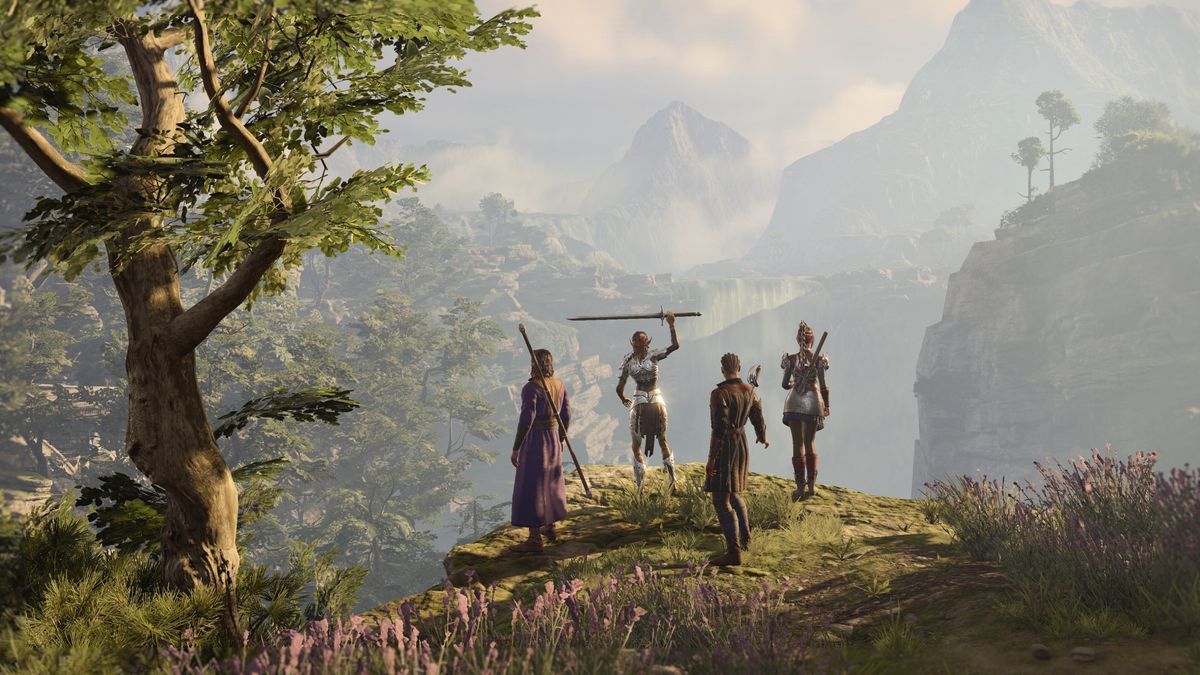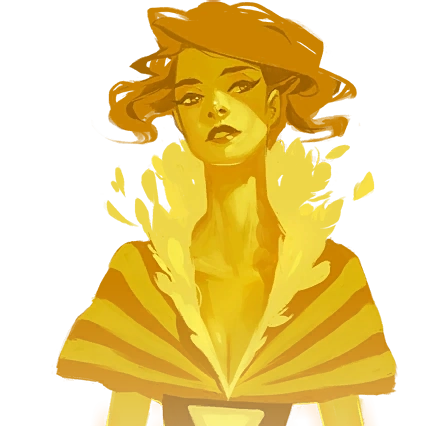“So then it’s onboarding people, teaching them how to play D&D, which is really complex”
40 hours later of couch co-op with my inexperienced partner who chose Wizard for some reason, and their character is finally useful in battle near the end of act 2.
I try not to control them, I just say what I’m doing and planning so they don’t launch my team off a cliff. Occasionally I’ll say “Yes, counterspell cloudkill please.” but I’m mostly hands off. When asked for advice I give it, I’m not a monster, I just think if we’re playing together we should both get to play.
I haven’t played any DnD since 3rd, and my partner loves these role playing shows like Critical Role or whatever. My biggest takeaway I’ve had from our sessions is that those shows most not have any mechanics whatsoever.
Those shows have people that play the game a lot (critical role played for years before going live), they don’t teach mechanics to their viewers.
As a person w/ out d&d experience, who was broadly aware of the game (ie. know classes but not the difference between actions & bonus actions), I didn’t have a terrible time onboarding. I started as a paladin and found that most of what I could do was pretty apparent and my friends who probably knew less than me seemed to catch on just as fast.
Some things like throwing potions wasn’t as obvious but I could see some choice paralysis from being a spellcaster.
Honestly after a while I stopped caring and just enjoyed that I could do three actions per round as a Monk. Does it matter that Gale can’t throw this grenade? Nope. Can he take this healing pot? He sure can! I don’t care for minmaxing and optimising my playstyle, I prefer to wing it and see how it goes. If an NPC dies in the process, RNGesus has spoken.
DnD is stupidly complicated and hopefully this is a call out to WotC to realise that their system isn’t the gold standard because of its rules, but moreso out of happenstance.
It’s funny you say this when 5E is considered the “simplified” version, and 6E (One DnD) is suspected to be more complex. Pathfinder 1e(basically dnd 3.5E) is way, way more complex and even pathfinder 2e, which is much more simpler than 1e, is more complex than 5e.
In any case, as TTRPGs go, current DND is quite simple. However, it seems that some people who enjoy RPGs just want a simpler experience I guess.
Eh, there are different kinds of simplicity. My big problem with 5E is that it puts so much at GM discretion without any strong guidance than it feels like a completely different system between one GM and the next. This does in fact make character creation (and to a lesser extent gameplay) needlessly complicated because what constitutes an optimal (or even reasonable) character depends heavily on which rules the GM is going to choose to use.
Stealth is a great example. If you compare the rules involving stealth in Pathfinder 2e and D&D 5e, on the surface, it looks like 5e stealth is simpler to handle. PF2e has a chapter on it, 5e just tells you to roll stealth against passive perception. But the problem is that’s not a complete ruleset, so the DM needs to fill in the gaps, and every DM is going to have their own version of the stealth rules cobbled together from dozens of ad hoc rulings which ultimately ends up being more complicated than if the rulebook just laid it all out to begin with.
The system I basically started TTRPGs with was Pathfinder. It’s rediculously more complex, but it’s complex for a reason. The rules are created I’m a way that there are almost no limits to what actions you can take that are covered. D&D has a lot of options, but some of it just has to be left the the DM.
Then we have BG3, which removed even more options, though for good reason. Creating a video game that can account for anything the player can do is hard, though some things are just missing and I’m not sure why. For example, no grappling (by the player). My guess would be that may be for animation reason (having to account for non-humanoid grappling) but I feel like they could have done something to make it work.
Dnd 5e has many legacy concepts that exist the way they do just because thats how older versions worked.
I only ever found the magic classes complicated when I was new. The limited spells per day and number of cast rules, what you had access to as what, memorizing, etc… All a lot of work compared to other games I was used to just having a mana pool.
Yeah. It’s a holdover that doesn’t work great. Vancian casting is pretty weird. It’s impressive how easy bg3 makes learning the casting.
The fact that they let prepared casters change prepared spells without a long rest is a HUGE buff. As written you pick your spells when you long rest, and if it turns out you needed something you didn’t prepare you’d be out of luck
You can long rest pretty much anywhere out of combat so does it make any difference when you can prepare?
There are certain timed events where a long rest can change the outcome, so in those cases it’s very helpful to be able to prepare if you encounter a situation that you’re not ready for.
The fact that you can long rest basically whenever is a huge break from D&D’s expectations. Namely, the adventuring day. Granted, D&D’s adventuring day is hot garbage so I see why they didn’t stick to it.
But you’re right it doesn’t make a huge difference in BG3, outside of the few timed events, but it is a buff.
It’s a holdover that doesn’t work great.
It… Does. I enjoy having spell levels and slots way more than something like mana. In any system with mana I almost always use either the most dmg/mana efficient spell or the big one, etc. Having spells be divided in levels and action/bonus action makes for a much more interesting combat.
For example, I much preferred the way DS1&2 does spellcasting compared to DS3 and elden ring. You have a limited amount of casts and the system forces you to either have a varied spellcasting repertoire or to find your way to get several of the same spell to ge more uses. Mana is… mana. Boring.
Coming from Pathfinder, I find 5e really simple and scoffed at the title but if you’ve never played before it’s a great point
I know this will be a very controversial comment, but I actually can’t stand the combat (extremely unfamiliar with the genre as a whole, and I’ve also never been a fan of turn-based systems), but love the game to death. As a result, I’m using a trainer to essentially trivialize combat encounters, because my BG3 addiction stems from the characters, their stories, the incredible world and the exploration it offers, the side quests, the lore, the insane detail in every corner of the map. I also work 80 hour weeks and want to spend the little time I get with the game doing what I love most, which is exploration and delving into my characters’ stories.
I’ve just gotten through Moonrise Towers (and have done all I can find to do in each area so far, although I already know I’ll be doing multiple playthroughs), and it’s one of the most immersive and enjoyable gaming experiences I’ve ever had, despite the fact I’m quite literally cheating my way through combat encounters. I’m basically playing it as a very interactive ‘choose your own adventure’ novel, with weapon and armor pickups being cosmetic-only in nature, and the focus of my playthrough being on exploring the world and delving into its inhabitants’ backstories and the mysteries they hold.
Playing a game differently to make sure you’re having fun is fine to me (presuming you’re not messing up other people’s multiplayer experiences or something, which isn’t the case here).
Don’t see why this would need to be controversial.
I guess I’m still expecting the reddit response to this kind of thing. I got torn to shreds over there for saying this, despite it being a game I’m playing solo.
What’s a “trainer” ?
a separate program that allows one to “cheat” (not a bad thing, as long as it’s not done in multiplayer) by scanning and modifying the game’s memory.
for example, it could figure out where your hitpoints are stored and constantly overwrite that value with your full hit points
What about the combat is so unbearable for you? Is it too complex or too long per encounter? I’ve played a lot of CRPGs so to me the combat is very intuitive and one of my favorite parts of the game.
I think it mainly comes down to the length per encounter, on top of the turn based system and mechanics I’m very unfamiliar with. I have pretty severe ADHD too, so it’s kinda a perfect storm of combat mechanics I’ve never been a fan of. I prefer real time, “learn the patterns” style combat ala Dark Souls or Sekiro. If I was younger and had more time to play, I’d likely have pushed through and learned the way BG3 plays on a fundamental level, but the reality is, I have 3-5 hours to play once or twice a week, and I just don’t want to sacrifice time in a combat system I don’t find enjoyable when I could be out adventuring and meeting new characters.
I don’t disagree with your stance, but I am curious why you decided on a trainer instead of picking the easier difficulty. Did you try it and still find it too much? I have read about the differences between modes but haven’t actually tried anything other than normal, and even though I’m extremely familiar with PF 1e and D&D 5e I’ve struggled with lots of encounters.
I initially started on easy, but just found it far too complex of a system to get my head around, and when my work hours can see me going days between play sessions, any knowledge I do pick up often isn’t retained. I also just don’t enjoy turn based combat at all, so when I enter combat, I just throw on god mode and infinite turns to get it over and return to the story or quest more quickly (I’ll often alter things depending on what’s happening in the game at the time though. For example, I did the Gauntlet of Shar with Shadowheart on her own, as it felt like something she needed to tackle solo, even if I wasn’t in any genuine danger.)
I guess tl;dr - even easy was a bit too much for me to take in given my work schedule, as well as the combat taking a lot of time away from the aspects of the game I love, namely exploration and stories.
Then fucking play something else. This game is for fans you stupid small dicked cunt
Then fucking comment somewhere else. This thread is for discussing combat difficulty, not raging at other people’s opinions you stupid small dicked cunt.
“You’re having fun wrong”
I play on explorer, but really am confused why they don’t allow multiclassing on that difficulty setting.
I would assume that it helps casual players by removing confusing options ans reducing choice paralysis. There’s already a lot to choose and think about with one class - multi classing makes it even more complex and scary.
I learned to play D&D Advanced Ed, TMNT the rpg, Shadowrun 1st edition, GURPS, and others, when I was 10-11 years old.
It’s not particularly complex, you just have to be interested enough to read and take the time to learn the ruleset.
I’ve been thinking about this a lot because I have two weekly games, and both have at least one player who just doesn’t really master the rules.
They’re not stupid people. But they don’t pick up the rules. Ten weeks in and I’m still reminding them about opportunity attacks. One group isn’t playing DND and one player has similar problems.
I don’t know what to do.












